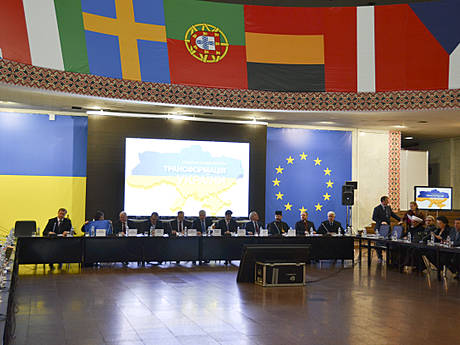
Business and public organizations of Ukraine, representatives of the clergy, international institutions have developed a draft concept of a large-scale qualitative transformation of the state. It is based on current domestic realities and an analysis of successful experience of positive change in Central and Eastern Europe, namely Poland. The Polish government has confirmed its readiness to help Ukraine make a breakthrough in development and involve EU partners in this process. This issue was discussed at a meeting of the Third National Forum "Transformation of Ukraine."
"Recently, we have actively explored the experience of Central and Eastern Europe ‒ Poland and others ‒ as for the process of transformation. And there is something we can borrow. For comparison: in the early 90s, the economy of Ukraine and Poland was almost at the same level. Last year, our country's GDP amounted to $86 billion, while Poland's was estimated at $500 billion. The gap is striking, isn't it? Given that we have managed to partly save the industrial, technical, innovative potential. Despite everything, the IT sector has been developing ‒ we rank first in Europe as for the supply of IT services. It's a paradox that there are possibilities but there is no development, and it must be tackled as soon as possible," President of the Ukrainian League of Industrialists and Entrepreneurs, Chairman of the Anti-Crisis Council of NGOs Anatoliy Kinakh said.
He stresses that the Ukrainian authorities and society will have to solve pressing issues that are indispensable for an economic breakthrough and tangible improvements. They include the security of doing business, the protection of the rights of owners and investors, the creation of conditions for equal competition, development and implementation of programs for industry, IT, agriculture, and others.
"The system of reform is inefficient in Ukraine, as it hinders the international development of the country's economy," head of the EU Delegation to Ukraine Jan Tombinski said. "Ukraine is now slowly moving in that direction. You have set accession to the EU as a strategic goal, but the question is how to make it the fastest and most efficient way. Our goal is help Ukraine realize its potential. And believe me ‒ the EU is interested in this."
Other representatives from the EU countries who attended the Forum also pointed to the sluggish and inconsistent reform in the country. They unanimously recommended that Ukrainian society, the government, businesses should consolidate efforts around a single concept of the country's development and work on it as soon as possible. For several months, the Forum's ad hoc monitoring group, which included domestic and international experts, had previously been examining and evaluating programs, strategies of Ukraine's development and prospects for their successful implementation. Based on this analysis, it elaborated proposals aimed at overcoming the current social and economic crisis in Ukraine and drew up a draft concept of transformation of the country.
Participants in the Forum presented the recommendations to national experts and international partners as for the use of successful experience in Central and Eastern Europe, including Poland, in the effective transformation of the state.
They, in particular, propose strengthening cooperation with international partners ‒ including in the framework of a future tailor-made project. Currently, there is an intensive dialogue between with representatives of the Forum and the government of Poland. The parties have held a number of meetings and agreed on ways of cooperation in detail. They are also mulling the possibility of establishing interparliamentary groups of both countries that would be taking care of these issues.
Both the Polish Sejm and some political forces of the Ukrainian parliament show interest in the cooperation.
What is more, the Forum stressed the need for developing a national strategy for transformation. It should take into account the current situation and needs of Ukraine, based on the experience of Poland. It should also anticipate the fulfillment of the Copenhagen criteria that are required for EU membership. The strategy will cover such areas as state security, a favorable business climate, the streamlining of the legal system, public finance, social policy, science, education as well.
All initiatives involve this country's leadership, parliament, active members of civil society and Western partners. The Forum and its developments have recently been presented to representatives of the European Parliament and EU delegates in Brussels and Lodz. The plans include the Forum's participation as a strong national public platform in the most prominent international forums. They particularly include the European Economic Summit, scheduled for June, and the July Warsaw Summit of NATO. "For the NATO Summit, the Forum has been preparing its proposals concerning security not only in Ukraine but also in the entire Europe," Anatoliy Kinakh said.